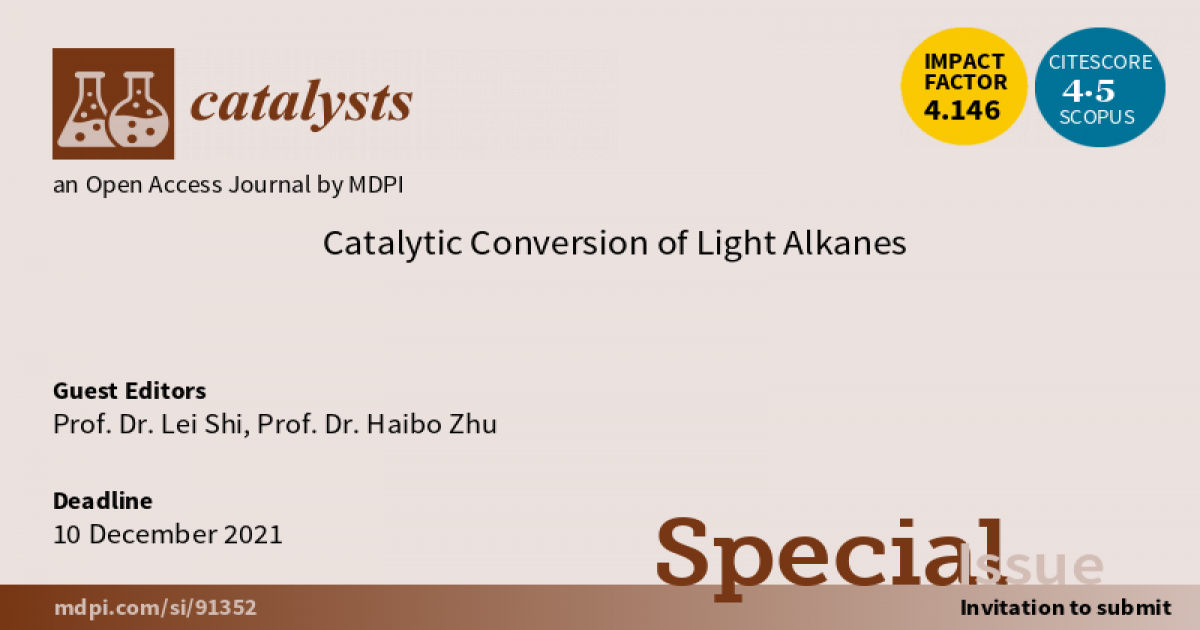- 4.0Impact Factor
- 7.6CiteScore
- 17 daysTime to First Decision
Catalytic Conversion of Light Alkanes
This special issue belongs to the section “Catalysis in Organic and Polymer Chemistry“.
Special Issue Information
Dear Colleagues,
Catalytic conversions of light alkanes into industrial chemicals, such as olefins, aromatics, oxygenates, and organic nitrides, are promising candidates for traditional petroleum-based or coal-based producing routes. In recent years, research enthusiasm in this field has been reignited by the rapid exploration of shale gas, combustible ice, and deep-water gas, which contain a considerable amount of light alkane resources. The main aim of scientists in this field remains to develop active, selective, and stable catalysts that are economical and environmentally friendly. New chemical-synthesizing strategies, structure-tuning methods, and novel catalyst systems are crucial to that end, but atomic-scale knowledge of catalyst structures and molecule-level understanding of reaction processes must be achieved in order to develop active and stable catalysts. Further advances are expected to combine theoretical simulation, spectroscopic characterization, and dynamic analysis to disclose the reaction mechanism under realistic reaction conditions.
This Special Issue aims to report on recent progress and developments in light-alkane-converting catalysts. It will focus on catalyst synthesis and characterization, as well as research into understanding the reaction mechanism of alkane conversion. We invite the scientific community to contribute original research or review articles that explore light-alkane-converting catalysts to optimize catalytic performance.
Prof. Dr. Lei Shi
Prof. Dr. Haibo Zhu
Guest Editor
Manuscript Submission Information
Manuscripts should be submitted online at www.mdpi.com by registering and logging in to this website. Once you are registered, click here to go to the submission form. Manuscripts can be submitted until the deadline. All submissions that pass pre-check are peer-reviewed. Accepted papers will be published continuously in the journal (as soon as accepted) and will be listed together on the special issue website. Research articles, review articles as well as short communications are invited. For planned papers, a title and short abstract (about 250 words) can be sent to the Editorial Office for assessment.
Submitted manuscripts should not have been published previously, nor be under consideration for publication elsewhere (except conference proceedings papers). All manuscripts are thoroughly refereed through a single-blind peer-review process. A guide for authors and other relevant information for submission of manuscripts is available on the Instructions for Authors page. Catalysts is an international peer-reviewed open access monthly journal published by MDPI.
Please visit the Instructions for Authors page before submitting a manuscript. The Article Processing Charge (APC) for publication in this open access journal is 2200 CHF (Swiss Francs). Submitted papers should be well formatted and use good English. Authors may use MDPI's English editing service prior to publication or during author revisions.
Keywords
- light alkanes
- catalyst synthesis
- catalytic dehydrogenation
- oxidative dehydrogenation
- selective oxidation
- ammoxidation
- aromatization

Benefits of Publishing in a Special Issue
- Ease of navigation: Grouping papers by topic helps scholars navigate broad scope journals more efficiently.
- Greater discoverability: Special Issues support the reach and impact of scientific research. Articles in Special Issues are more discoverable and cited more frequently.
- Expansion of research network: Special Issues facilitate connections among authors, fostering scientific collaborations.
- External promotion: Articles in Special Issues are often promoted through the journal's social media, increasing their visibility.
- e-Book format: Special Issues with more than 10 articles can be published as dedicated e-books, ensuring wide and rapid dissemination.

